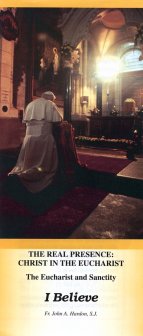 |
| THE REAL PRESENCE | CHRIST IN THE EUCHARIST |
 The Eucharist as the Real Presence is the touchstone of sanctity. As evidence of this fact we have the witness of the saints who,
when they speak or write about the power of the Blessed Sacrament to sanctify, seem to be positively extreme in their claims about what the Real Presence
can achieve in making a sinful person holy.
The Eucharist as the Real Presence is the touchstone of sanctity. As evidence of this fact we have the witness of the saints who,
when they speak or write about the power of the Blessed Sacrament to sanctify, seem to be positively extreme in their claims about what the Real Presence
can achieve in making a sinful person holy.
Notice we are concentrating on the Holy Eucharist as the Real Presence. We could also speak of the sanctifying power of the Mass and of Holy Communion, but that is not our focus of reflection here. Why not? Because it is the Real Presence in the Mass and in Communion that finally explains their efficacy, too. No Real Presence, no Mass; no Real Presence, no Communion. So that, in dwelling on the Real Presence, we are in effect talking about the Holy Eucharist - Presence, Sacrifice and Sacrament.
In order to appreciate the value of the Real Presence in the spiritual life, we must go back in spirit to the event described by St. John when our Lord, after He had worked the miracle of the multiplication of the loaves and fishes, made the solemn promise of the Eucharist.
"I am the Bread of Life," Christ declared on that occasion. "He who comes to me will never be hungry. He who believes in me will never thirst. But, as I have told you, you can see me and still you do not believe. All that the Father gives me will come to me and whoever comes to me, I shall not turn him away because I have come down from heaven, not to do my own will, but to do the will of the one who sent me. Now the will of him who sent me is that I should lose nothing of all that he has given to me and that I should raise it up on the last day. Yes, it is my Father's will that whoever sees the Son and believes in him shall have eternal life and that I shall raise him up on the last day."
By now we have read and heard and meditated on these words many times, but they deserve further reflection because they contain so much mystery that after nineteen centuries of the Church's existence she has not begun to exhaust the richness of their meaning.
Every time we go back, every time we go back to Christ's words of revelation, we always discover something new. Always! The key word in Christ's discourse on the Eucharist is the word believe. In fact, after He promised the Blessed Sacrament many of the Jews who heard Him did not believe. "This is intolerable language," they said. "How could anyone (meaning themselves) accept it?"
"After this," we are told, "many of his disciples left him and stopped going with him." And the evangelist further explains that, "Jesus knew from the outset those who did not believe and who it was that would betray him." We might add that when we are told that the Savior knew who did not believe, that was not only contemporary, but all future knowledge. He foresaw who would and who would not believe, and let us make sure that the evangelist's juxtaposition of those who did not believe and those who would betray Him is the relationship of cause and effect. All the traitors of Christ have been those who, having believed, stopped believing.
This article is available as a brochure in full color and may be ordered from:
Eternal Life
P.O. Box 787
Bardstown, KY 40004-0787
E-mail: orders@lifeeternal.org
Internet: www.lifeeternal.org
Fax: 502-348-2224
Visa and Mastercard orders call:
1-800-842-2871
Copyright © 2001 by Inter Mirifica
All rights reserved worldwide.
Adorers Society | PEA Manual | Essentials of Faith | Dictionary | Thesaurus | Catalog | Newsletters
|
Real Presence Eucharistic Education and Adoration Association
718 Liberty Lane Lombard, IL 60148 Phone: 815-254-4420 Contact Us Internet: www.therealpresence.org Copyright © 2000 by www.therealpresence.org All rights reserved worldwide. No part of this publication may be reproduced, stored in a retrieval system, or transmitted, in any form or by any means, electronic, mechanical, photocopying, recording or otherwise, without the prior written permission of www.therealpresence.org |